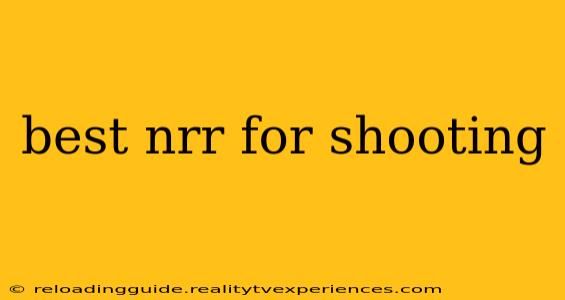Shooting sports demand precision, focus, and the right equipment. Noise Reduction Rating (NRR) in hearing protection is a critical factor affecting your performance and long-term hearing health. Choosing the best NRR for shooting isn't simply about picking the highest number; it's about understanding your environment and finding the sweet spot between protection and clear communication.
Understanding Noise Reduction Rating (NRR)
The NRR is a standardized rating indicating how much a hearing protector reduces noise exposure. A higher NRR means more noise reduction. However, it's crucial to understand that the NRR is a laboratory rating and real-world reduction can vary depending on factors like:
- Fit: An improperly fitted hearing protector will significantly reduce its effectiveness.
- Environmental factors: Wind, temperature, and other noises can affect the overall reduction.
- Individual variation: How effectively a hearing protector reduces noise can vary slightly from person to person.
Therefore, while a higher NRR is generally preferred, a comfortable and properly fitted protector with a slightly lower NRR might offer better protection in practice than a poorly fitted one with a higher rating.
Determining the Right NRR for Different Shooting Disciplines
The ideal NRR depends heavily on the type of shooting you engage in.
High-Power Rifle Shooting:
High-power rifle shooting generates extremely loud noises. In this context, an NRR of 30 or higher is generally recommended to ensure adequate hearing protection. Electronic hearing protection with a high NRR and amplification capabilities is especially beneficial, allowing you to hear commands and environmental cues while still protecting your hearing from the deafening blast of the rifle.
Pistol Shooting:
Pistol shooting produces significantly less noise than rifle shooting. While a lower NRR might be sufficient, it's still crucial to protect your hearing. An NRR in the 25-30 range is a sensible choice for most pistol shooting scenarios. Again, electronic hearing protection can be advantageous, enabling better communication and situational awareness.
Shotgun Shooting:
Shotgun noise levels fall somewhere between pistol and high-power rifle shooting. An NRR in the 28-32 range often provides a suitable balance of protection and situational awareness for shotgun shooting. Consider the gauge and type of ammunition used; larger gauges and heavier loads will produce louder noises requiring a higher NRR.
Sporting Clays/Trap/Skeet:
The repetitive nature of these sports emphasizes the importance of long-term hearing protection. While the individual shots might not be as loud as rifle shots, the cumulative effect over time can be significant. An NRR of at least 25 is recommended, with higher values preferred. Electronic hearing protection is particularly beneficial here, allowing for continued communication with fellow shooters.
Beyond NRR: Other Important Factors
While NRR is a key consideration, other aspects of hearing protection are equally important:
- Comfort: Uncomfortable hearing protection won't be worn consistently, rendering the NRR irrelevant. Choose a comfortable design that fits snugly without causing pressure points.
- Durability: Invest in high-quality, durable hearing protection that can withstand the rigors of regular use.
- Ease of use: Select a design that is easy to put on and take off quickly and effortlessly.
- Communication: For group shooting, consider electronic hearing protection to enable clear communication.
Conclusion: Prioritizing Hearing Health
Choosing the "best" NRR is a personalized decision based on your shooting discipline and individual needs. Prioritize comfort, fit, and overall hearing health. Don't hesitate to try several different models to find what works best for you. Remember, protecting your hearing is a lifelong commitment; investing in quality hearing protection is an investment in your future enjoyment of the shooting sports.

